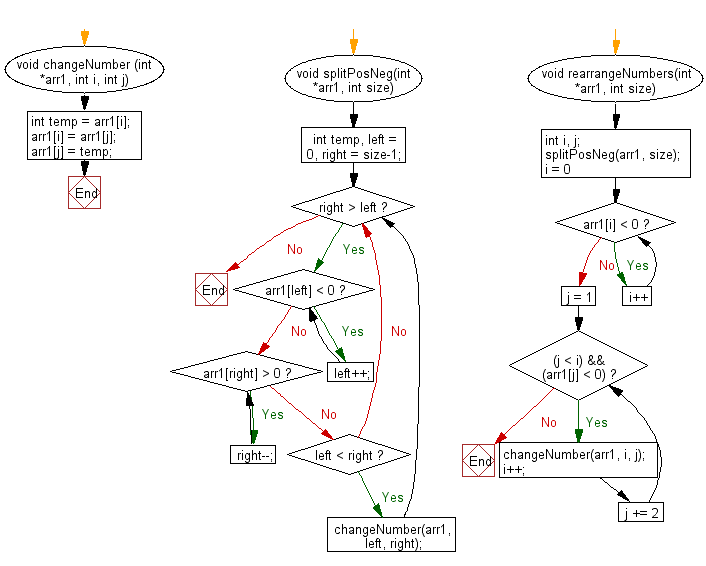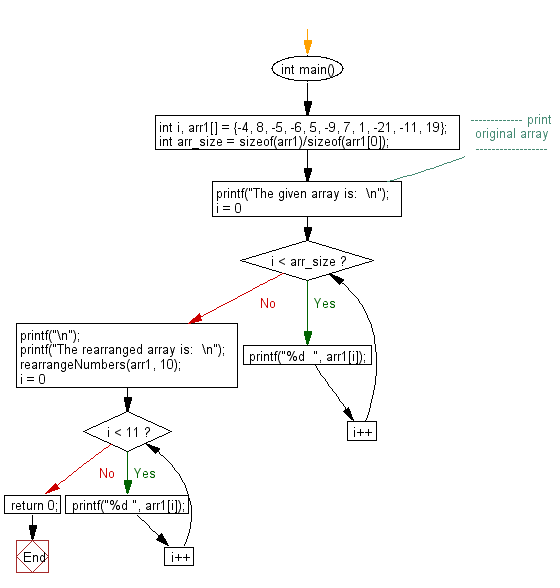C Exercises: Rearrange positive and negative numbers alternatively in a given array
93. Rearrange Positive & Negative Numbers Alternately
Write a program in C to rearrange positive and negative numbers alternatively in a given array.
N.B.: If positive numbers are more they appear at the end and for also negative numbers, they too appear in the end of the array.
Expected Output:
The given array is:
-4 8 -5 -6 5 -9 7 1 -21 -11 19
The rearranged array is:
-4 7 -5 1 -21 5 -11 8 -9 19 -6
The task is to write a C program that rearranges the elements of a given array such that positive and negative numbers alternate. If there are more positive or negative numbers, the extra numbers will appear at the end of the array. The program should iterate through the array to reorganize the elements accordingly and then display the rearranged array.
Sample Solution:
C Code:
#include <stdio.h>
// Function to swap two numbers in an array
void changeNumber(int *arr1, int i, int j)
{
int temp = arr1[i];
arr1[i] = arr1[j];
arr1[j] = temp;
}
// Function to split positive and negative numbers in the array
void splitPosNeg(int *arr1, int size)
{
int left = 0, right = size - 1;
while (right > left)
{
// Move left pointer to find a negative number
while (arr1[left] < 0)
left++;
// Move right pointer to find a positive number
while (arr1[right] > 0)
right--;
// Swap positive and negative numbers if left < right
if (left < right)
{
changeNumber(arr1, left, right);
}
}
}
// Function to rearrange positive and negative numbers alternatively
void rearrangeNumbers(int *arr1, int size)
{
int i, j;
// Split the array into positive and negative parts
splitPosNeg(arr1, size);
// Find the first positive number's index
for (i = 0; arr1[i] < 0; i++);
// Rearrange the numbers (one positive and one negative alternatively)
for (j = 1; (j < i) && (arr1[j] < 0); j += 2)
{
// Swap positive and negative numbers
changeNumber(arr1, i, j);
i++;
}
return;
}
int main()
{
int i, arr1[] = {-4, 8, -5, -6, 5, -9, 7, 1, -21, -11, 19};
int arr_size = sizeof(arr1) / sizeof(arr1[0]);
//------------- print original array ------------------
printf("The given array is: \n");
for (i = 0; i < arr_size; i++)
{
printf("%d ", arr1[i]); // Print the elements of the original array
}
printf("\n");
//-----------------------------------------------------------
printf("The rearranged array is: \n");
rearrangeNumbers(arr1, 11);
for (i = 0; i < 11; i++) {
printf("%d ", arr1[i]); // Print the rearranged array
}
return 0;
}
Output:
The given array is: -4 8 -5 -6 5 -9 7 1 -21 -11 19 The rearranged array is: -4 7 -5 1 -21 5 -11 8 -9 19 -6
Flowchart:/p>


For more Practice: Solve these Related Problems:
- Write a C program to rearrange an array so that positive and negative numbers alternate, maintaining their original order.
- Write a C program to alternate positive and negative numbers and then append extra numbers at the end.
- Write a C program to rearrange an array with separate partitions for positive and negative numbers using two-pointer technique.
- Write a C program to recursively rearrange an array so that positives and negatives alternate.
Go to:
PREV : Check Consecutive Elements in Array.
NEXT : Largest Element of Each Contiguous Subarray of Size k.
C Programming Code Editor:
Have another way to solve this solution? Contribute your code (and comments) through Disqus.
What is the difficulty level of this exercise?
Test your Programming skills with w3resource's quiz.
